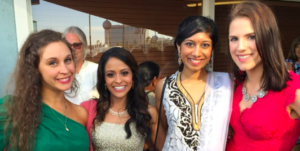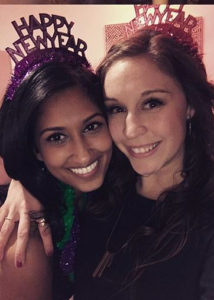February 8th, 2018
Doctoring in Lipstick
Cassie Shaw, MD

Cassie Shaw, MD, is a 2017-18 Chief Resident in Internal Medicine at Saint Louis University Hospital in Saint Louis, MO
Why do I feel weird wearing lipstick in the hospital? Why do I have to announce myself as a doctor to gain respect from patients and other members of the hospital staff? In my short time as a physician, I have yet to find the answer to these questions, but they seem to lie in my set of XX chromosomes. As in all other areas of life as a female, being a doctor comes with a different set of rules than that of my male colleagues. These rules are never mentioned or taught, but they are apparent the first time you step foot into the role. We aren’t men, but we need to fit in with them and act like them — but we also have to act like women, in the right ways, of course. Confused yet? Same. Let’s consider some questions about the abilities of a physician who’s also a woman.

The photos in this post are dedicated to my female colleagues who are all creating their own mold as physicians. Brit, Physical Medicine and Rehab; Ellen, Internal Medicine and Michaela, Emergency Medicine
Question 1
Can she be a leader? Can she provide medical care and make critical decisions? Yes, with tremendous effort. I quickly learned to state my role clearly when walking into a room. “Hello, Mr. X, I am your doctor.” Of course, it’s inevitable that a patient, nurse, or family member will ask to talk to the “real doctor,” or say “oh, I’m not used to a lady doctor,” or reference a male colleague as “the doctor.” Even worse is when staff members double-check with a male in the room to see if my plan was the medical plan for the patient. Meanwhile, none of my male colleagues have ever been assumed to be any healthcare professional other than a doctor.
Question 2
Can a woman who is physician also be feminine? If we do not wear makeup, we are asked if we are sick or having bad day. If we do wear lipstick or a skirt, negative assumptions are made about our IQ and our abilities as a doctor. Not only is our appearance a careful balance, but so are our interactions. A woman cannot use even the slightest tone of forcefulness when advocating for her patient without being labeled as that 5-letter word that begins with a b: bossy. In fact, if we aren’t sugary sweet, we are quickly written off as being angry, rude, or a another 5-letter word that begins with a b. (Use your imagination.) Meanwhile, when my male colleagues do the same, it causes a flurry of action to complete the task they’ve asked to be done without a single mention of his mood, how his day must be going, or his hormones.
Question 3
Can women work as physicians and have a home life? Yes, but to many, your home life is more important than your career life. Ultimately, society doesn’t judge us by our accomplishments at the bedside, but on those within the home. Am I married? Have I had children? (Shouldn’t the real question be, why does it matter? I spent 23 years completing the rigorous education and training required to obtain the job I dreamed of and that accomplishment is swiftly diminished by these two questions.) I have a huge fear of moving forward with having children because I wonder what might happen to my career. The life of a physician is far from flexible. My partner (and the would-be baby-daddy in this hypothetical scenario) is also a physician, but you can have one guess as to who society would expect to give up a portion of their career in order to raise a child. Or worse, if I did not cut back at work and hired help instead, I would be that terrible mother whose children are “raised by a nanny.” Again, not a word would be said about my partner’s work load as a physician who is male.
Okay, if it wasn’t obvious, I’m being facetious when asking and answering these questions. Women can be, and are, accomplished, astute clinicians, who are leaders in their fields and at the bedside, all while wearing whatever makeup they choose and maintaining whatever work-life balance they desire. However, these are all challenges that they face daily. I attribute many of these challenges to the way women entered the role of a physician. Like all of our roles in male-dominated fields, women before me fought to obtain foothold here. They weren’t welcomed as physicians in their own right, so they squeezed themselves as closely as they could into the mold of a physician created by their male counterparts. It’s obvious, though, that we aren’t made to fit that mold. We have our own mold, but that does not preclude us from being excellent physicians.
Recently, as I reflected on all of these experiences, I decided to make a change. I started small: I wore lipstick while on service. Initially, it was uncomfortable and awkward but when I assisted my intern with her first lumbar puncture while rocking my sassy pink lipstick, it was a tiny, but empowering, salute to my femininity. I had both worlds exactly as I wanted them. I wasn’t blending into my male-dominated surroundings. I was forming my own mold. It wasn’t just about lipstick anymore.
So, to end this blog, I’m looking right at my co-physicians who also happen to be women. Remember, we aren’t female physicians or “lady doctors.” There is no need for that gender-defining adjective. We are physicians and, ladies, we are crushing it. We are balancing things our male counterparts would never dare to try and can never understand. However, we are still doing it all within the mold created by men. It’s time to break out of that mold. It’s time to show off our power and stop blending. It’s time to do things our own way.






Thought provoking and Very well written. I am a physician and now in my fifties with my physician husband who has been on my side always but I agree some of these things are taken for granted. A woman physician goes through much more, physically and emotionally than a male counterpart in the same field.
I think you are very right about trying to fit in the mold they created. We need to create our own. Well said and you are going to be one who will help bring the change!
Sadly, a lot of us who have been crushing it for decades now still end up getting crushed by it in the end….
I agree wholeheartedly with this. I am working nonstop, each and every day, to fight against the stigma we face from patients and colleagues alike, as female physicians. I took off some time to be a mother to my kids, and now I’m back at my career, and stronger than ever. We CAN do both, and we will rock at excelling in them!
Cassie, your essay is very well written and insightful. I also realize that your questions are the same questions I struggled with 40 years ago when I was a medical student.
It takes a great deal of thought and good planning to balance a medical career and family life. There are trade offs but just keep asking for advice along the way.
And yes you can wear lipstick but be sure to wear comfortable shoes. You can’t run to Codes in high heels!
I’m not a physician but worked in hospitals most of 40+ years working in medical records and in IT. While working in medical records I remember a married couple who were both Ob-Gyn doctors. In those days doctors dictated most of the required documents such as op reports, history and physicals, etc. Whenever the wife called with dictation, transcriptionists had to deal with the sounds of children in background. When the husband called, it was usually nice and quiet without the kid noise in background.
What a sexist article and bogus article! If a man were to write something like this he would be shamed by the media and fired (and now days probably sued). You are a sexist and a bigot shrouded by lipstick.
Interesting. As a Third year resident and Mommy I agree with the male bias in medicine and hear your concerns. However I fell that you are wasting too much precious time and emotional energy worrying about what everyone thinks. I always wear lipstick! I had a baby at the end of med school. I was breastfeeding as an intern! Yes I found a room to express in. No, no one gave me slack. I have found that if you are a hard worker in general, collegial to all and confident about your choices that things tend to fall into place. Good luck!
Don’t settle to fit in. In spite of the pressure you’re under, which is certainly worse for women, not being able to be authentically yourself is not worth it. Even after all those years of hard work and sacrifice to be a doctor it is not worth losing You. You can believe me, I did that and it didn’t work out. Bigger picture, everything always works out in the end, but the pain and sufferIng all those years was self inflicted in reality. This is why your dialogue is so powerful, it increases awareness and helps others empower themselves to be bravely themselves in a judgemental and unforgiving environment. It’s awesome!
Amen, Amen,Amen, sister
I am old enough (79) to appreciate two perspectives. True, the female physician was a relative rarity early during my professional training. I clearly remember the dilemma our Chairman faced when confronted with accepting a female into our general surgery residency program. But, during that same time frame, a male registered nurse was looked upon as a “duck out of water”. However, I believe current statistics suggest females represent almost equally the sex presentation as physicians and males equal females in nursing. Times a ‘changing, Cassie.
Same thing across the pond…
Just for context: I’m a (almost) 43 year-old portuguese rheumatologist, I wear no lipstick and I´m partialy white-haired (female, married (to a -male- physician) with 3 kids).
So, what’s the first thing I hear when I’m about to start my joint injection clinic this morning?
-” Where’s the doctor?!!” and that was a female patient asking, by the way…
Nicely written … I am a male physician and a residency preceptor in Family Medicine, the majority of my residents are female right now (as are more than half the current medical students here in Brasil).
In a country where social patriarchy is still the reigning norm, the fight for feminism and equality is still in the hands of the fighters and not the institutions. So we are female physicians having to struggle with being asked to be MORE PROFESSIONAL than their male counterparts.
People expect women to be motherly and emotive in every aspect of their lives, and in medical school it seems it is tried to take that away from female students at all costs. This kind of sexually based pressure makes for a terrible learning environment. And it also makes for turning normal, intelligent young ladies into perfectionist sociopaths.
I love that there is this discussion and that room is being made by and for the feminine and female in medicine … Go get them girls !!!
PS: will be making this blog entry a permanent mandatory read for new residents and will copy paste to my 8 year old “read as you grow” papers.
No objections but just a reminder that women are not the only ones who face prejudice.
When I remember my days in residency, frequently assumed to be the nurse (although I just introduced myself as doctor), I recall an excellent senior male resident from Ghana.
He was frequently assumed to be from housekeeping.
Cheers to continued improvement and equality for all.
As a long time patient-person with a combination of cancer and chronic illness, I have always sought out female physicians for my “team” of providers. It makes me happy when the doc who comes into my cubby in the ER is a woman. My daughter is also a newly minted physician confronting these issues. When my peers and friends were going through medical school, I watched them have to “do it backwards, in heels” and time has proven, to me at least, that I get better care from these women. carry on with crushing it, and know that there is at least one patient out there who will never ask to see the doctor when she’s standing right there in front of me.
On the same point of view:
February 5, 2018
Putting the “She” in Doctor
Ersilia M. DeFilippis, MD1
Author Affiliations
JAMA Intern Med. Published online February 5, 2018. doi:10.1001/jamainternmed.2017.8362
have a good time
I’am not a robot but a man…
Text
Margaret Ann Bulkley,1 an Irish military surgeon in the nineteenth century, lived a double life. She disguised herself as a man so she could enroll in medical school and pursue a surgical career. She insisted she not be changed out of the clothes in which she died. However, her sex was accidentally revealed in 1865. In the twenty-first century, women enter medicine in large numbers. Yet, I wonder what I could accomplish if I followed Dr Bulkley’s lead, if I practiced medicine as a man.
Funny,
Went to med school in France in the 1990’s and had similar experience. Even though our class was more than 50 percent women we had to choose either loosing our feminine side to fit in or keep it but having to deal with the chauvinist attitude of our peers and teachers.
However, I loved medschool and have fond memories of that time.
After med school I chose not to practice and work a nine to five job to be able to raise my three children. I still use the knowledge I acquired at the time in a corporate environment.
I hope my daughter will try med school. I will encourage her to wear makeup if she wishes to…. I want her to feel like you can be pretty and smart too
I agree with your article except I do have an issue with introductions. EVERYONE should introduce themselves whim interacting with a patient by name, credentials, and experience. It was a requirement in the hospital where I worked (see AIDET). I always notice when it is not done. So many people in and out of the room with patient and family wondering who the hell are you and what do you plan to do.
Cassie – we have come a long way as a society but as you eloquently describe we still have plenty of room for growth. I am a white woman specializing in a traditionally male dominated field (PCCM) and get mistaken for a nurse routinely despite my white coat and dresses (lipstick is not my deal but you rock it)!
I brought up these experiences with perceptions on rounds with my residents and fellow team as we had a patient who kept asking for the “real doctor.” I asked if anyone else experienced this before as well. I anticipated the women physicians to say they were confused as nurses which was eye opening to the young white male doctors to which this NEVER occurred. However, I was not prepared for the African American physicians to share they were routinely confused as respiratory therapists or even house keeping.
Please continue to bring light to the perceptions but also expand our circle for others that are less well represented. Our fight for equality is everyone’s fight.
Hello Dr. Shaw — Great post. My daughter is a second-year med student. Any advice for her, and any women at the start of her medical training? Anything you’d do differently, or more or less of?
I know it must suck to constantly get mistaken for the nurse when you have worked so hard to become a physician. But don’t take it out on the nurses. You can turn the (mostly female) nurses into your allies and champions. As an older nurse and a feminist, I have a profound respect for the younger women entering the field of medicine and I want you to succeed in every possible way and I am cheering you on. And I have met too many woman with a beautiful amazing brain and also a beautiful amazing wardrobe, to let a little thing like your perfectly pink lipstick make me think less of you as a physician or respect you less.